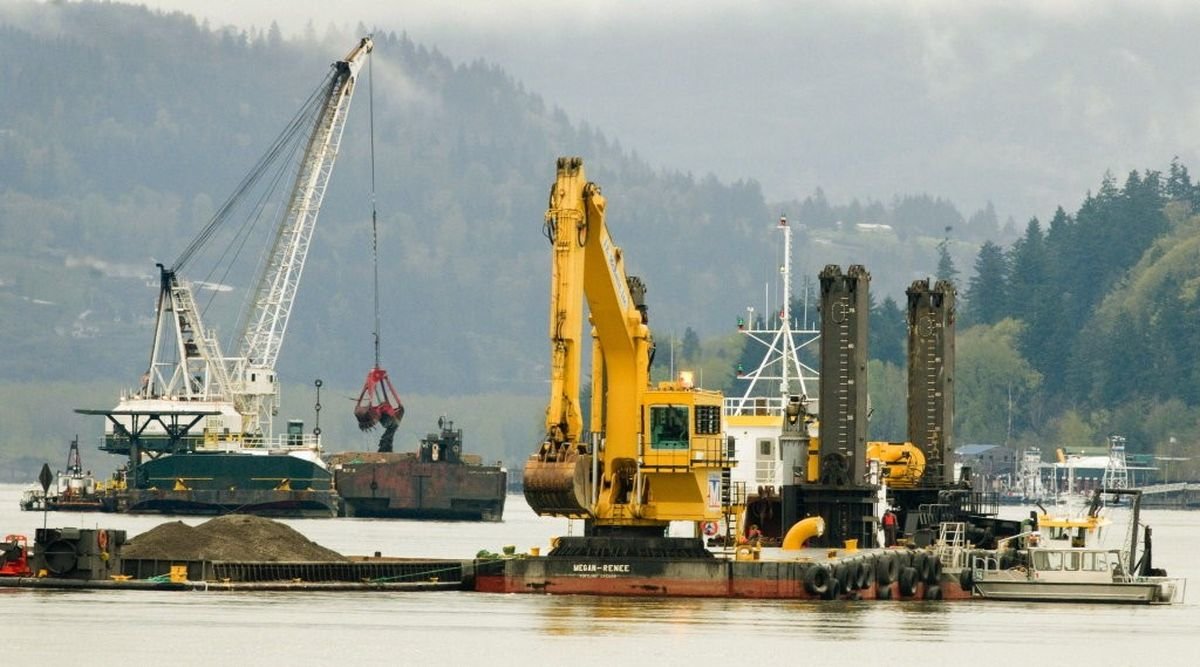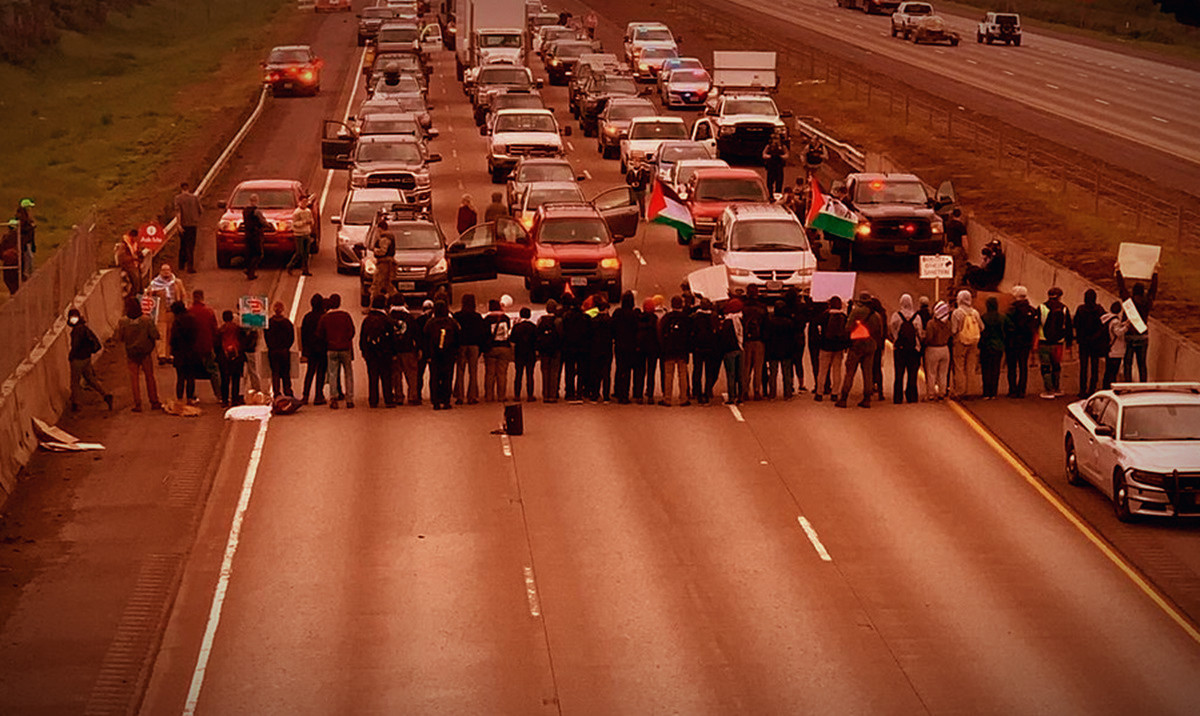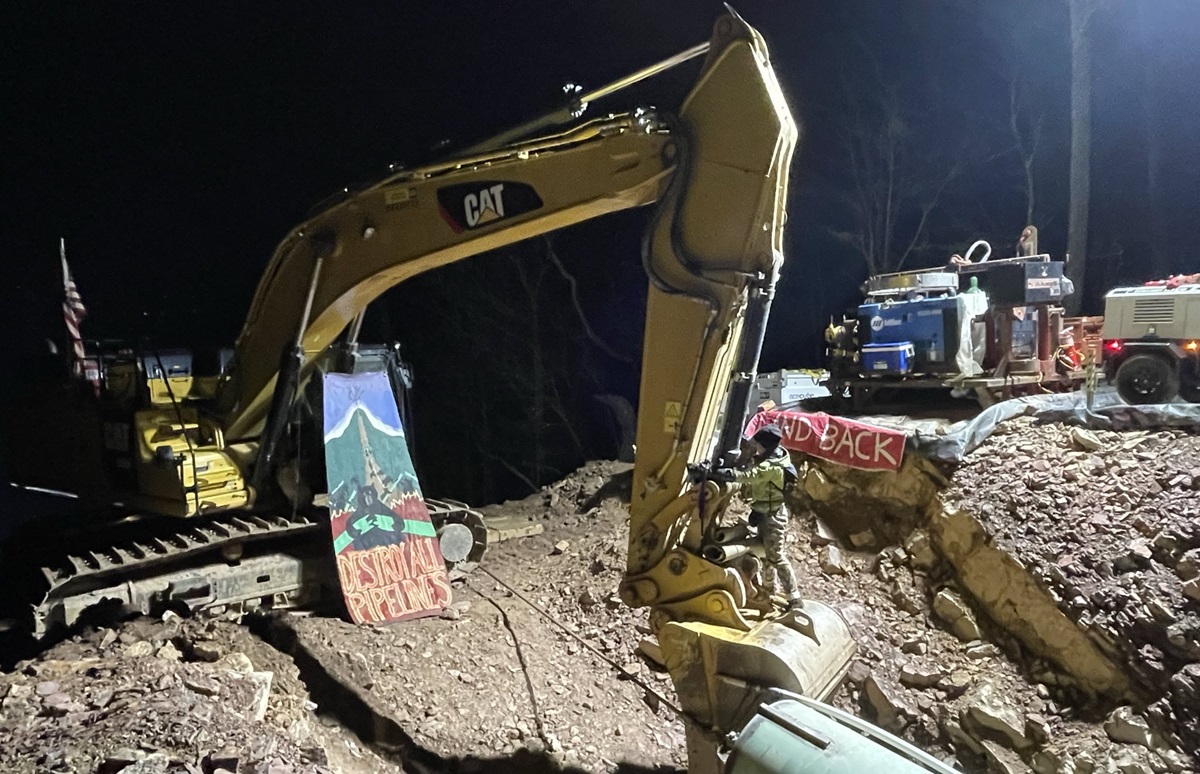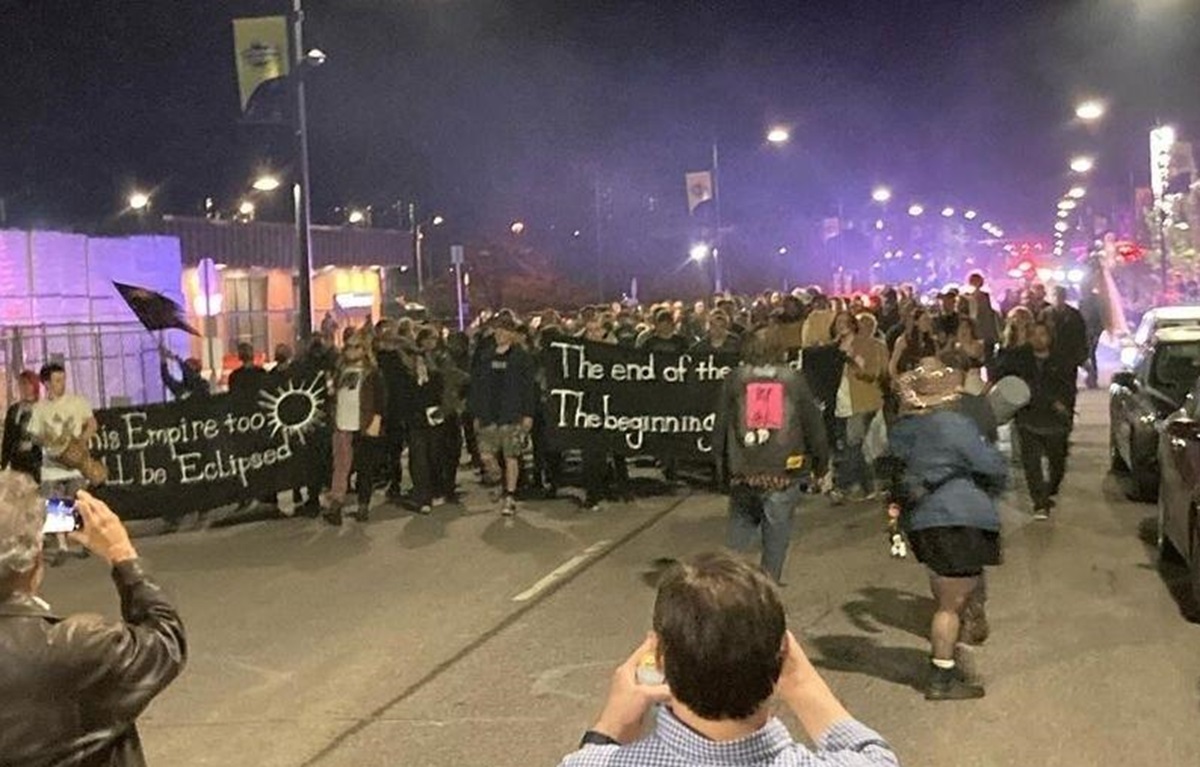Filed under: Analysis, Labor, Northwest

A look at the evolving situation involving various labor unions along the Columbia river near Portland, Oregon.
Just before Christmas, on December 17, 2018, a multibillion dollar corporation called Columbia Export Terminal filed a SLAPP lawsuit (Strategic Lawsuit Against Public Participation) against 154 of the individual stevedore workers at its Portland, Oregon river dock. The suit demands that these workers pay the company nearly 16 million dollars. The suit also names these workers’ union, the ILWU, as a defendant.
The next day (December 18), before the workers or their union had even yet been served a copy of the lawsuit, The Oregonian (a major regional capitalist newspaper) released an article publicizing this lawsuit and its sensational accusations against the workers.
The tactical purpose of this lawsuit is to punish these workers for engaging in collective bargaining. The last collective contract agreement between Columbia and the ILWU expired at the end of May, 2018. The workers have been working without a contract since that time, while Columbia and a number of its fellow companies in the grain export business have been telling the union they want the workers to work longer hours under more draconian management control, and that they want to stop funding the workers’ pension fund and medical benefit plan.
So far, the union has refused to help these companies impose these measures upon the workers during this particular round of contract bargaining. Columbia hopes that, by threatening to bankrupt the union and its individual members, they can compel it to help the companies implement their agenda against the workers.
Columbia Export Terminal, according to Rueters Business News, is owned as a joint venture between the US based corporation Archer Daneils Midland, a 40 billion dollar global company specializing in foodstuffs trading and transport, and the Japan based corporation Marubeni, a 7 trillion dollar global company invested not only in foodstuffs but also power plants, forestry, chemicals, housing real estate, mining, metal processing, shipbuilding, aerospace and automobile manufacturing.
The trillionaires’ lawsuit starts by accusing the stevedores of working fewer hours than their payslips record, and escalates from there to accuse them of the sensational J. Edgar Hoover themed federal crimes of “Wire Fraud” and “Mail Fraud” (on the basis that the payslips are “wired” to a central payroll office in California, and that their paychecks issued from there are then “mailed” back to Oregon).
Naturally, the union will now send its lawyer into court to argue in defense of what limited legal rights these workers have under capitalist law. This is good, of course, because few if any of the workers could ever afford to hire a lawyer individually (no, not even with their union wages), our union dues are for exactly that purpose, and the capitalist judges are more likely to listen to an argument presented by a lawyer than to any workers who attempt to defend themselves in court without one. The union’s lawyer will present a defense of the workers’ rights to take breaks while on the clock, and to relieve each other for those breaks in turns, under the past practice provisions of their recently expired and historic collective bargaining agreement. The bosses’ lawyers will of course argue that those terms either no longer apply or perhaps never applied to their present round of accusations against these workers. It is possible that the union’s argument will convince the court.
However, regardless of what facts and evidence are presented by the two sides, it is likely that the capitalists’ court will automatically rule against the laborers—simply because the are laborers and an autonomous working class movement is very weak. At this moment of time, the crisis of capital has the bourgeoisie on the offensive where they’re actually taking away our gains made through bitter battles over the past few decades. Also, at this moment, the relation of power between workers and the capitalist class are in favor of the capitalist class. We should militate to overturn that political situation. After all, any law passed under capitalist rule will always be in the interests of the capitalist class, even if it affords us some basic bourgeois-democratic rights in an attempt to pacify our struggles.
Regardless of whether or not Columbia can convince a magistrate that the workers were working for less time than their contract/job description said they should have been, the workers are still right and the company is still wrong.
Even though cargo and freight transport industry workers might not produce a physical product that you could eat, wear or hold in your hand, in many instances these workers are part of the distribution of raw materials for the productions of physical goods. Their labor over generations has given rise to a specific branch of modern industry. This branch includes corporations which sell a commercial item known variously as the “tonnage mile”, “tonnage kilometer”, “nautical tonnage kilometer”, “tonnage knot” or “Tonnage Equivalent Unit (TEU)” to capitalists in other branches of industry at rates negotiated in and determined by the capitalist market.
The hours which these laborers work to EARN their wages–by producing the wealth (in the form of value) which buys those wages—is only a small fraction of the time they are compelled to work to get PAID those wages. The extra time they work creates additional wealth (surplus value) which ADM and Marubeni steal and call “profit”. They then use this profit to do things like establish governments with “courts” which call this theft “legal” and criminalize all workers and laborers.
Even IF the stevedores of Columbia Export Terminal worked shorter hours than their bosses said they should have at the time (and that’s a big “IF”), then they would simply have been rightfully reclaiming some of the value of their lifetimes from the exploiters who have been ROBBING them.
However, in the highly possible event that the capitalist court sides with the capitalists in this attempt to rob the workers even further, the court would probably try to force the union to help implement the collection of the loot from this crime. The union would then have to make a very important political decision: whether to remain a legal organization by assisting the bosses as ordered, or whether to remain loyal to the workers at the cost of becoming an “illegal” organization in the eyes of the sate power. There is, of course, another possibility which is even more likely (if the union is the only form of organization that the workers have)– the possibility that this threat of even POTENTIAL loss of legality will intimidate the union’s officers into agreeing to try to sell the bosses’ desired contract concessions to their membership in return for the lawsuit being dropped or settled. This is in fact what has happened to most unions in the US in most rounds of contract bargaining since the decline of the last major wave of union militancy in the US during and immediately following the Great Depression.
In 1947, the federal government (as part of a measure called the Taft Hartley Act) ordered all US labor unions to force their individual members to swear an oath of loyalty to capitalism, to expel every union member who refused to do so, and to assist the employers in firing and banning any such union member who would not take the oath. Eleven unions refused to do this to their members, and, as a result, those eleven unions were expelled from the Congress of Industrial Organizations (known today as the AFL-CIO). Soon thereafter, all but two of those eleven unions were physically destroyed by coordinated attacks by the government, the employers and AFL and/or CIO unions which had proven their loyalty to capitalism by making their memberships take the oath. The ILWU is one of only two of those eleven unions which has managed to continue to exist to the present day.
Because the ILWU is historically both more militant and more internally democratic than most other surviving labor unions in the US, the process of its degeneration from a workers’ organization into an organization to the control and contain labor uprisings –and to be a source of capital accumulation itself – has occurred much more slowly than in the case of almost every other union in the country. In fact, that process of degeneration is still not even yet fully complete within the ILWU, which means we cannot completely discount the possibility that this union MIGHT, in occasional instances, take strong fighting actions against the bosses and for the workers, even in the face of extreme pressure to do the opposite. However, there is nothing magic about the ILWU which makes it immune to those pressures, particularly in the extreme absence of working class political organization which has been the prevailing condition in the US for so many generations now. Albeit slowly, the ILWU has also been following the same path of decay as the rest of the US unions. Year by year, since at least 1961, the instances in which the ILWU has MOBILIZED its membership against the bosses have become less and less frequent, and the instances in which it has DE-MOBILIZED worker insurgencies within its ranks in order to preserve “labor peace” have become more and more frequent (even though the former type of instance still occasionally occurs).
One of the primary tools that the bosses and their governments have effectively used, throughout the world, to hasten the containment and degeneration of stevedores’ unions such as the ILWU is the displacement of workers and jobs from that specific part of industry via automation. Automation simultaneously increases labor’s productivity and decreases labor’s value, because fewer workers are needed to crank out the same or greater levels of production after automation than were needed to do so before the automation. This causes both a temporary spike in profits for the capitalist and a displacement of workers from the industry being automated.
Automation does NOT shrink the size of the international working class as a whole, nor do the machines replace the working class as the source of capitalist profit. The increased production soon leads to a drop in the price of the commodity being produced, which leads to the development of further industry and the eventual employment of even more workers somewhere else (unless the goods being produced are war materials, in which case, the human economy really does shrink). However, automation can displace large numbers of workers across specific industries and throughout specific regions, throwing many working class communities into chaos.
The price drop in automated commodities also causes the bosses to push for the remaining workers, running the machinery of automation, to work faster and to work longer hours (because the capitalists miss that temporary spike in profits they experienced between the burst in automated productivity and the drop in prices with followed it).
In this case, Columbia’s website openly boasts that its Terminal 5 in Portland, Oregon is “one of the most automated” grain export facilities in the world. Even more displacement by automation is one of the issues at stake in this ILWU contract negotiation.
The vast majority of workers in the ILWU naturally support their union, and they are not wrong to do so. For them (unlike for many union members in the US at this point) the POSSIBILITY of using their union to do what it was originally built to do—fight the capitalists in defense of the workers—still very much exists. But it is only that: a POSSIBILITY. In order to bring that possibility into reality, the workers cannot simply depend on their union alone.They will have to build a higher level of organization, one that can counteract the political pressure that the bosses, their government and possibly the union itself are applying from above. Otherwise, the only possible outcomes for the workers are: another small step backwards, or another huge step backwards.
The most advance workers need to autonomously and independently be organized, They need to construct solid relations with the rest of the rank and file to engage in the fight against exploitation and domination from their own perspective as they build their own working class alternative. These organizations must not be limited to the economic sphere but must be primarily POLITICAL organizations of workers and laborers. We are not to be foot soldiers for either fraction of the capitalists. We should enter the field of struggle on our terms, bring our politics and class perspective and agenda to the table. We cannot limit ourselves to their forms of struggle without ultimately just enlarging their slices of the cake we bake!
Workers Struggle hopes and strives for actual victories by workers in the struggle against bosses. We will continue to report on this situation as it develops, and will do whatever we can to assist the laborers of the Columbia River in building the level of organization that it takes to win such a victory.
TIME TO BUILD OUR ORGANIZATIONS!
INDIVIDUALLY WE’RE WEAK, COLLECTIVELY WE’RE STRONG!





